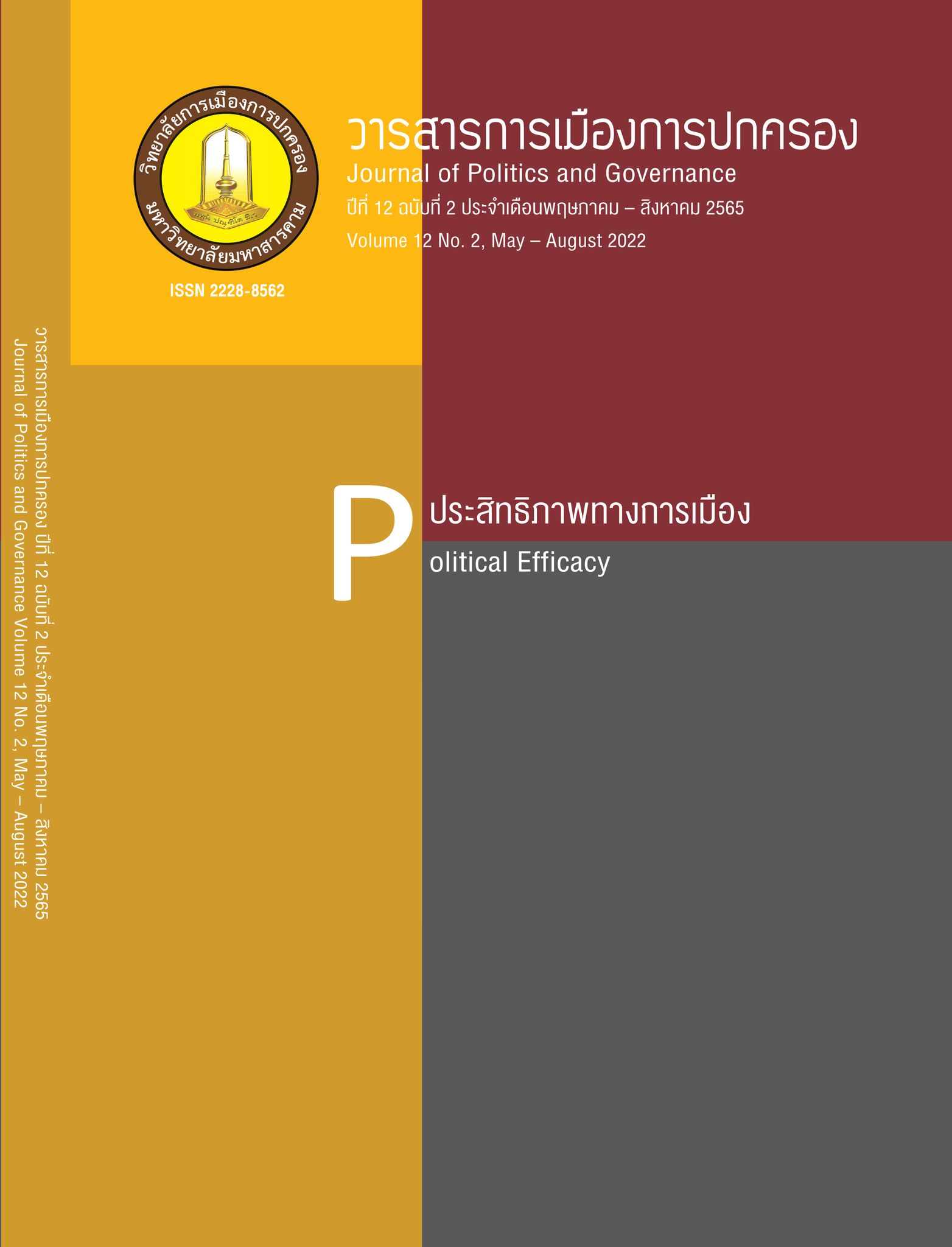Higher Educational Institutions and the Support for the Completeness of Business Eco-system of Social Enterprises in Thailand
Main Article Content
Abstract
The research paper on Higher Educational Institutions and the support for the completeness of Business Eco-system of Social Enterprises in Thailand had 2 objectives. The first aim was to analyze the completeness of business eco-system of social enterprises in Thailand. The second objective was to analyze roles played by higher educational institutions in the business eco-system. The methods for data collection were documentary research and semi-structured interview in focus group meeting setting. Key informants were the executive staff of Bachelor of Arts Degree Program in Creative Development, Puey Ungphakorn School of Development Studies, Thammasart University. The method for data analysis was content analysis from documentary data and the interview data. The study result found out that the Thai government has had clear policy to support social enterprise since 2010 until the successful entry into force of the 2019 Social Enterprise Promotion Act. Registration system for special support and specific supervising agency establishment were stressed. Finance providers often granted non-financial supports along with start-up grants, while loans and social impact investment were less in number. Market access through public procurement mechanism has been in the early stage of development, but initiatives by the private and civil societal sectors have been put in place. Banpu Public Company Limited has been a key player of business support infrastructure, while SET Social Impact has been a key player of supporting organizations and Social Enterprise Thailand Association of peer organization among social enterprises. Higher educational institutions have had critical role in supporting the development of future social entrepreneurs. At present, increasing numbers of them have developed diverge types of curricula and activities involving social enterprises including bachelor degree and master degree curricula as well as short course.
Article Details
References
คณะกรรมการการศึกษาและจัดทำรายงานเรื่องวิสาหกิจเพื่อสังคม. (2558). รายงานเรื่องการศึกษาวิจัยประกอบการจัดทำร่างกฎหมายว่าด้วยวิสาหกิจเพื่อสังคม. กรุงเทพฯ: สำนักกรรมาธิการ 1 สำนักงานเลขาธิการสภาผู้แทนราษฎร ปฏิบัติหน้าที่สำนักงานเลขาธิการสภาปฏิรูปแห่งชาติ.
ณัฐวีณ์ บุนนาค. (2562). การสำรวจบทบาทของสถาบันอุดมศึกษาเพื่อส่งเสริมความสมบูรณ์ของระบบนิเวศทางธุรกิจของวิสาหกิจเพื่อสังคม. กรุงเทพฯ: ทุนสนับสนุนการวิจัยคณะสังคมศาสตร์ มหาวิทยาลัยเกษตรศาสตร์.
ประทิน นุชเปี่ยม, ติญทรรศน์ ประทีปพรณรงค์, และบงกช เจนจรัสสกุล. (2561). วิสาหกิจเพื่อสังคม ในประเทศไทย: ข้อสังเกตบางประการต่อร่างพระราชบัญญัติส่งเสริมวิสาหกิจเพื่อสังคม. วารสารสำนักงานผู้ตรวจการแผ่นดิน, 11(1), 109-141.
สำนักงานเลขาธิการสภาการศึกษา. (2560). แผนการศึกษาแห่งชาติ พ.ศ. 2560-2579. กรุงเทพฯ: พริกหวานกราฟฟิค จํากัด.
สำนักงานคณะกรรมการการอุดมศึกษา. (ม.ป.ป.) รายชื่อสถาบันอุดมศึกษาในสังกัดของสำนักงานคณะกรรมการการอุดมศึกษา. สืบค้นจาก http://www.mua.go.th/university.html
Defourny, J. (2014). From Third Sector to Social Enterprise: A European Research Trajectory. in J. Defourny, L. Hulgard and V. Pestoff. Social Enterprise and the Third Sector. New York: Routledge, 17-41.
Elkington, J. (1998). Cannibals with Forks: The Triple Bottom Line of 21st Century Business. London: New Society Publishers.
Inter – American Development Bank. (2016). Study of Social Enterpreneurship and Innovation Ecosystems in South East and East Asian Countries, Country Analysis: Kingdom of Thailand/ The Japan Research Institue. Retrieved from https://publications.iadb.org/bitstream/handle/11319/8064/Study-of-Social-Entrepreneurship-and-Innovation-Ecosystems-in-South-East-and-East-Asian-Countries-Country-Analysis-Kingdom-of-Thailand.pdf?sequence=1London: SAGE Publications Ltd.
Moore, J.F (1993). Predators and Prey: The New Ecology of Competition. Harvard Business Review, 71(3), 75-83.
Nonthanathorn, P. (2015). CSR and Social Enterprise Roles for Social Problem Solving. Journal of Social Development, 17(2), 13-34.
Pearce, J. (2003). Social Enterprise in Anytown. Lisbon: Calouste Gulbenkian Foundation.
Ridley-Duff, R and M. Bull. (2011). Understanding Social Enterprise: Theory and Practice. New York: Sage Publication.
Ridley-Duff, R. (2008). Social Enterprise as a Socially Rational Business. International Journal of Entrepreneurial Behaviour and Research, 14(5), 291-312.
UNDP and Change Fusion (2019) Mapping the Social Impact Investment and Innovative Finance Landscape in Thailand. Bangkok: UNDP Thailand.


